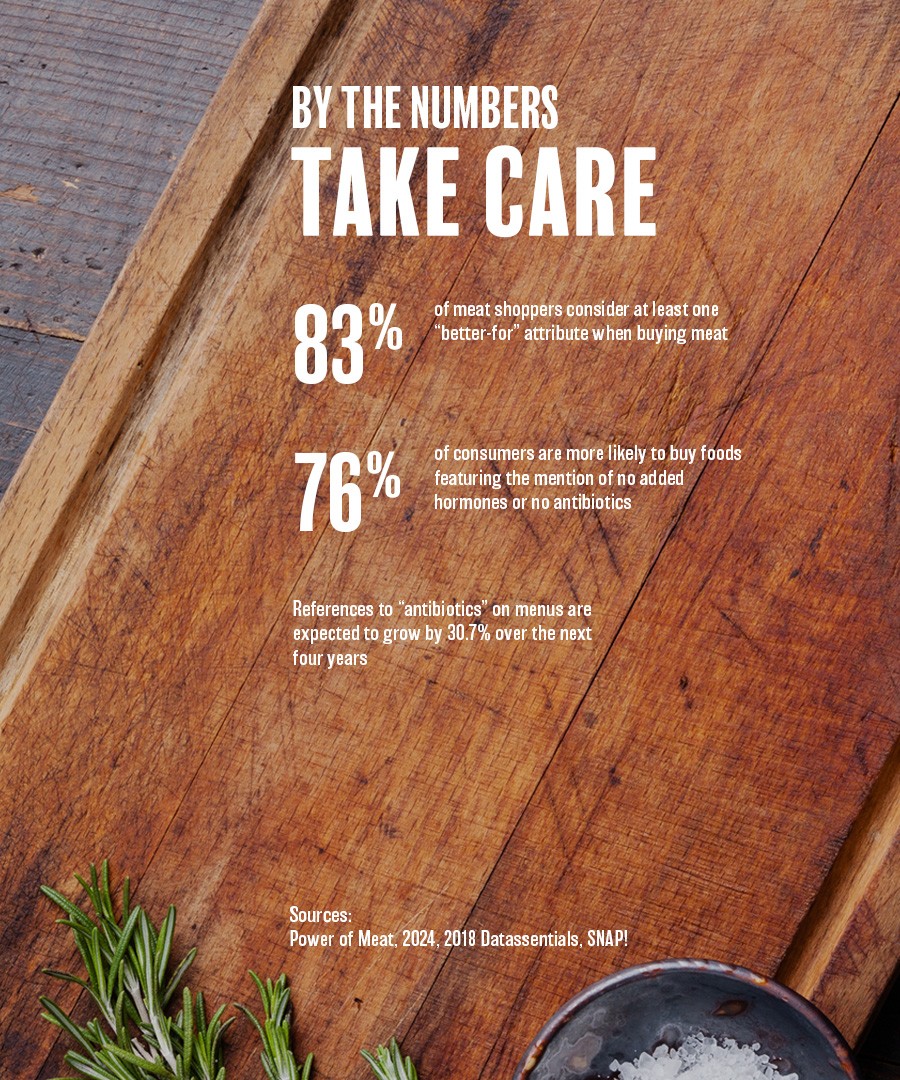WHY ANIMAL CARE MATTERS TO DINERS
And why it should matter to you
As conversations around where food comes from continue to grow, restaurateurs are now putting more thought into what they’re serving and, more importantly, how the food is getting to the menu. According to NSF, consumers are concerned about animal welfare in the food industry, as well as the origin of animal products in food production.
Nearly 70% of consumers say that animal wellness is either very important or extremely important to purchasing decisions, and they place importance on companies demonstrating transparency and compliance in animal wellness throughout their global supply chains (NSF Animal Wellness Study 2024). When it comes to animal welfare, today’s diners are looking for more food options, more accountability and greater transparency from the people who bring food to their plates. Many consumers are concerned about the treatment and care of agricultural animals – including how they’re raised and what they’re fed.
At a time when meat consumption in the U.S. is projected to remain consistent from 2022 until at least 2031 (Statisa 2024), operators should continue asking questions about how their food is raised and leverage the use of third-party certifications to increase transparency for their diners. Some recognized certifications for animal care include USDA Organic, Certified Humane and Animal Welfare Approved, among others.
HOW TO BRING ANIMAL CARE TO THE FOREFRONT OF YOUR MENU
Choose the right labels
Menus with dishes that include animal care claims can expect a median-price-per-dish increase over those that don’t (Datassential 2019, Summer Scoop). Additionally, it’s important to treat your menu as a contract between you and your diners. When you make a claim or apply a label, it should be 100% accurate.
Below is a combination of claims and third-party certifications. Please reference our Serve Good® policy.
- Raised Without Antibiotics: Producers must adhere to USDA’s Food Safety and Inspection Service (FSIS) guidelines that prohibit administration of antibiotics in feed, water or by injections at any point in the production process, including ionophores which are considered to be antibiotics by FSIS
- Humanely Raised: In response to consumer concerns about the care and treatment of farm animals, several third-party organizations have developed guidelines for promoting humane care of livestock species in collaboration with stakeholders such as farmers, veterinarians, scientists, animal advocacy groups and industry professionals
- Certified Humane: Products with Certified Humane certification, administered by the Humane Farm Animal Care (HFAC), are certified as being from animals found to be raised and handled in compliance with HFAC’s animal welfare standards from birth through slaughter, and further processed in compliance with traceability requirements
- American Humane Certified: AHC certification indicates that the American Humane Association found that a product meets the group’s species-specific Animal Welfare Standards covering issues such as adequate space, air and water quality, heating, lighting, shade, and the animals’ ability to engage in ordinary behaviors
Cage-Free Eggs: Per the USDA’s Shell Egg Grading System guidance, cage-free systems may “vary from farm to farm, but must allow hens to exhibit natural behaviors and include enrichments such as scratch areas, perches and nests. Hens must have access to litter, protection from predators, and be able to move in a barn in a manner that promotes bird welfare.”
Visit the Hungry For Better Resource Library for more articles full of valuable insights and tips on food sourcing, sustainability, food waste and more.


